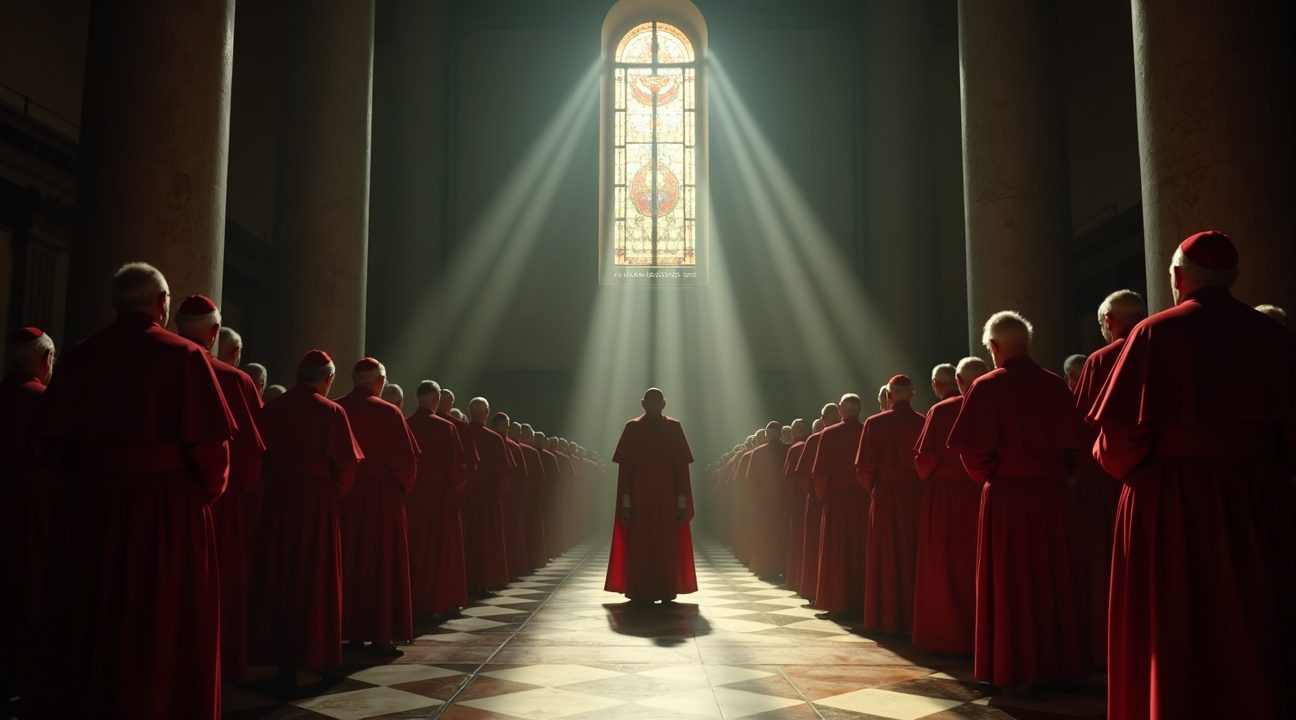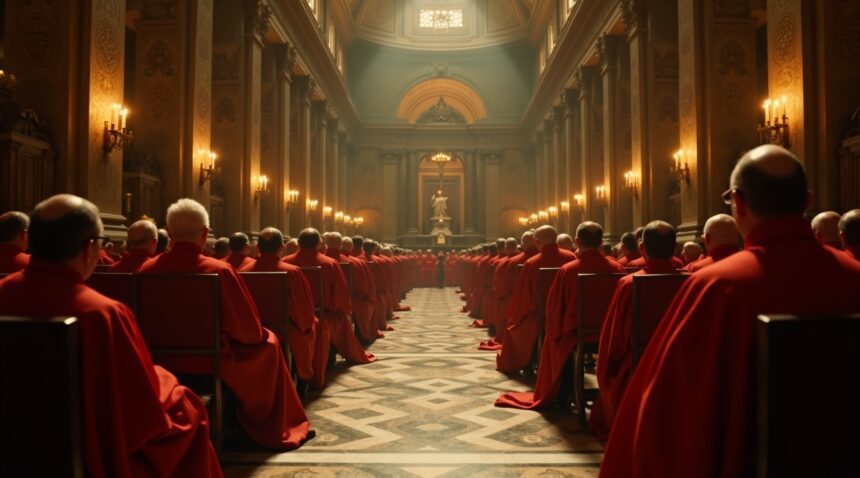Edward Berger’s “Conclave” achieved an extraordinary feat at the 2025 BAFTA Film Awards, claiming both Outstanding British Film and Best Film in a stunning dual victory that caught the industry off guard.
Key Takeaways
- “Conclave” won both Outstanding British Film and Best Film at the 2025 BAFTAs, securing four total awards including Adapted Screenplay and Editing.
- The film triumphed over major contenders such as “Blitz,” “Gladiator II,” and “Bird” in a surprise victory that stunned industry insiders.
- This Vatican political thriller reimagines papal selection as a gripping drama, emphasizing psychological tension and character development rather than spectacle.
- The production showcases modern international filmmaking centered around British roots, blending global partnerships while maintaining cultural authenticity.
- This BAFTA triumph suggests a shift toward rewarding ambitious dramatic storytelling over commercial franchise-driven films, potentially shaping the trajectory of future British cinema investment and development.
To learn more about the 2025 BAFTA Film Awards and other notable winners, visit the official BAFTA website.
“Conclave” Shocks Film World with Dual BAFTA Victory
Edward Berger’s “Conclave” achieved something extraordinary at the 2025 BAFTA Film Awards, claiming both Outstanding British Film and Best Film in a stunning dual victory that caught industry insiders off guard. This remarkable feat represents one of those rare moments when a single production dominates both categories, establishing itself as a powerhouse that few expected to see coming.
Record-Breaking BAFTA Performance
The film didn’t stop at its dual crown, securing four BAFTAs total—more than any other British production that year. Beyond its headline victories, “Conclave” also claimed awards for Adapted Screenplay and Editing, demonstrating excellence across multiple technical and creative disciplines.
I found it particularly striking how the film managed to sweep past heavyweight contenders including:
- “Blitz”
- “Gladiator II”
- “Bird”
- “Kneecap”
- “Lee”
- “The Outrun”
- “Love Lies Bleeding”
These were productions that many had considered frontrunners heading into the ceremony.
A Historic Achievement in BAFTA History
Winning both Outstanding British Film and Best Film in the same year represents an uncommon achievement in BAFTA’s storied history. This dual recognition speaks to the film’s exceptional quality and broad appeal among voters, who clearly saw something special in Berger’s vision.
The director’s emotional acceptance speeches highlighted the collaborative spirit behind the production, emphasizing how the entire team contributed to this unexpected triumph.
The victory has sent ripples through the film industry, with many comparing this surprise to other unexpected successes we’ve seen recently. Just as unexpected films have managed to climb rankings against all odds, “Conclave” has proven that compelling storytelling and exceptional craftsmanship can overcome even the most competitive fields.
Industry experts are already discussing what this victory means for British cinema moving forward. The film’s success demonstrates that audiences and critics alike are hungry for thought-provoking content that pushes creative boundaries. Much like how streaming platforms continue expanding their creative reach, “Conclave” shows that traditional filmmaking still has the power to capture hearts and minds when executed with precision and passion.
This BAFTA sweep positions “Conclave” as a serious contender for other major awards throughout the season, potentially setting up what could become one of the most celebrated British films in recent memory.

Vatican Drama That Captivated Critics and Audiences
Edward Berger’s “Conclave” transforms the sacred process of papal selection into a gripping political thriller that has resonated with both critics and moviegoers worldwide. The film’s approach to Vatican intrigue is particularly compelling, as it strips away the mystique surrounding one of the world’s most secretive institutions and exposes the human drama beneath.
The story unfolds entirely within the Vatican’s walls, where cardinals gather to elect a new Pope following the pontiff’s sudden death. Berger masterfully captures the claustrophobic atmosphere of the Sistine Chapel, where religious duty collides with personal ambition and political maneuvering. The film doesn’t shy away from depicting the power struggles that occur behind closed doors, presenting a narrative that feels both authentic and deeply engaging.
International Production with British Roots
The film’s production represents a fascinating example of modern international filmmaking. Film Nation, Indian Paintbrush, Access Entertainment, Black Bear, and Focus Features joined forces to bring this ambitious project to life. This collaborative approach demonstrates how global entertainment partnerships can create content that transcends national boundaries while maintaining cultural authenticity.
Despite its international backing, “Conclave” retains its British film classification through significant UK creative and financial involvement. This classification proves crucial in understanding how contemporary British cinema operates within a global marketplace. The production’s structure shows that British films can compete internationally while preserving their cultural identity.
The ensemble cast delivers performances that have garnered widespread critical acclaim for their depth and subtlety. Each actor brings distinct personality traits to their cardinal characters, creating a chess-like dynamic where viewers must decipher motivations and allegiances.
- The performances avoid stereotypical religious portrayals
- Characters are presented as complex individuals
- Faith, duty, and personal desire intertwine in realistic ways
Berger’s direction emphasizes psychological tension over action sequences, creating suspense through dialogue and character development rather than spectacle. The film’s pacing builds methodically, drawing viewers into the ancient rituals and modern politics that define papal elections. This approach has proven particularly effective with audiences seeking sophisticated storytelling that respects their intelligence.
The Vatican setting becomes almost a character itself, with cinematography that captures both the grandeur and isolation of this unique environment. Production design authentically recreates the sacred spaces where these momentous decisions occur, while the script balances reverence for religious traditions with unflinching examination of institutional politics.
“Conclave” succeeds because it treats its subject matter with appropriate gravity while acknowledging the human elements that drive all political processes, even those conducted in the most sacred settings.
How “Conclave” Stacks Up Against 21st Century British Cinema Giants
“Conclave” has earned its place among the most distinguished British films of the 21st century, standing shoulder-to-shoulder with celebrated titles like Slumdog Millionaire, Casino Royale, and Pride & Prejudice. The film’s remarkable achievement in securing both Outstanding British Film and Best Film categories represents a rare double victory that occurs infrequently in BAFTA history.
The Vatican thriller joins an exclusive club of British productions that have captured international attention while maintaining distinctly British storytelling sensibilities. Slumdog Millionaire demonstrated how British filmmaking could embrace global narratives, while Casino Royale revitalized a quintessentially British franchise for modern audiences. Similarly, adaptations like Pride & Prejudice proved that classic British literature could be reimagined for contemporary viewers without losing its cultural essence.
The Shift Toward Ambitious Dramatic Storytelling
Conclave‘s victory signals an important shift in BAFTA’s recognition patterns. Rather than favoring commercial franchises or big-budget spectacles, the awards have embraced ambitious dramatic storytelling that tackles complex themes. This reflects broader changes in British cinema, where international collaborations have become increasingly common while maintaining distinctly British perspectives.
The film industry has witnessed unprecedented growth in British productions that achieve both critical acclaim and global reach. Streaming platforms have expanded opportunities for British content to find worldwide audiences, creating new pathways for success that didn’t exist at the century’s beginning.
Major British films of recent years demonstrate this evolution clearly. Productions like Three Billboards Outside Ebbing, Missouri and The King’s Speech showed how British filmmaking could attract international talent while telling distinctly human stories. Conclave continues this tradition by examining power, faith, and moral complexity within the Vatican’s secretive walls.
The film’s success also highlights the growing influence of British actors, directors, and crew members in international productions. Cross-border collaborations have strengthened rather than diluted British cinema’s identity, creating opportunities for more diverse and ambitious projects. Recent theatrical releases demonstrate this trend toward sophisticated storytelling that appeals to global audiences.
Conclave stands apart from many previous BAFTA winners by choosing intimate character study over action-driven narratives. The film’s focus on psychological drama and moral ambiguity reflects a maturation in British cinema’s approach to serious subject matter. This preference for substance over spectacle marks a significant departure from the franchise-heavy landscape that has dominated much of 21st-century filmmaking.
The recognition comes at a time when British productions are increasingly valued for their unique perspectives on universal themes. Films like Four Weddings and a Funeral and The Full Monty established templates for British comedy-dramas, while more recent successes have expanded into thriller, historical drama, and psychological study genres.
BAFTA’s dual recognition of Conclave acknowledges not just the film’s quality but its representation of British cinema’s current direction. The awards suggest that voters value sophisticated storytelling over commercial appeal, marking a clear preference for films that challenge audiences intellectually and emotionally.
This shift reflects broader industry trends where successful films often combine strong dramatic elements with international appeal. British cinema has found its niche by producing content that feels both distinctly British and universally relevant, creating a template that Conclave exemplifies perfectly.
The film’s achievement reinforces British cinema’s reputation for producing thoughtful, well-crafted dramas that resonate beyond their immediate cultural context. As the industry continues evolving, Conclave‘s success suggests that audiences and critics alike hunger for intelligent filmmaking that prioritizes character development and thematic depth over visual spectacle.

Industry and Public React to Unexpected Champion
Critics initially praised “Conclave” for Edward Berger’s disciplined direction, highlighting the film’s tightly constructed screenplay and rich, atmospheric cinematography. The thoughtful approach to filmmaking resonated with industry professionals who recognized the craftsmanship behind every frame.
Following the BAFTA wins, widespread discourse erupted across social media platforms and industry publications. The conversation centered particularly on what defines a ‘British film’ in today’s globalized production era. Many questioned whether nationality should be determined by funding sources, filming locations, or the cultural identity of the story itself.
Critical and Audience Response
Both critics and audiences expressed genuine surprise at how “Conclave” surpassed more commercially anticipated competitors. Several factors contributed to this reaction:
- The film’s smaller marketing budget compared to blockbuster releases
- Its focus on character-driven drama rather than spectacle
- The relatively unknown status of the source material among general audiences
- Competition from established franchise films and star-studded productions
Entertainment journalists noted that the win challenged conventional wisdom about what resonates with voters. Many had predicted that films with broader commercial appeal or more obvious technical achievements would dominate the categories.
The unexpected victory has come to symbolize strong industry support for auteur-driven, dramatic storytelling. Industry insiders view this as a positive shift away from purely commercial considerations. The win signals that craftsmanship and artistic vision still hold significant weight in critical evaluation.
Social media reactions ranged from celebration of underdog success to debates about the film’s British credentials. Streaming platforms quickly capitalized on the buzz, with several services reporting increased viewership following the awards ceremony.
Film industry veterans praised the recognition as validation for mid-budget productions that prioritize storytelling over spectacle. This sentiment echoed across trade publications, where commentators suggested the win might encourage more investment in similar projects. Major studios reportedly took notice, with some executives acknowledging the commercial potential of critically acclaimed dramas.
The film’s success sparked renewed interest in adaptations of literary works, with several production companies announcing plans for similar projects. Critics emphasized that “Conclave” demonstrated how intelligent filmmaking could capture both critical acclaim and audience attention without relying on familiar intellectual properties.
International film festivals also responded positively, with programmers noting increased submissions of character-driven narratives. The ripple effect extended beyond British cinema, influencing programming decisions and acquisition strategies across multiple markets.
Future Impact on British Filmmaking and Edward Berger’s Career
I expect “Conclave’s” BAFTA victories to create ripple effects throughout the film industry, expanding its reach far beyond traditional theatrical releases. Streaming platforms will likely prioritize the film’s distribution, recognizing the marketing value that comes with prestigious awards recognition. International markets that previously overlooked British dramas may now actively seek similar content, creating new revenue streams and distribution opportunities for UK productions.
Industry Investment in Auteur-Driven Projects
The film’s success sends a clear signal to industry stakeholders about the commercial viability of director-focused narratives. I anticipate this recognition will encourage producers and distributors to invest more heavily in projects that prioritize artistic vision over formulaic approaches. The entertainment industry often follows trends established by award winners, and “Conclave’s” triumph demonstrates that audiences respond positively to sophisticated storytelling. This shift could lead to increased funding for independent filmmakers and smaller production companies willing to take creative risks.
Future BAFTA nominations may reflect this changing landscape, with voting committees potentially showing greater appreciation for bold cinematic choices. Studios might adjust their development strategies, seeking scripts and directors that offer unique perspectives rather than safe commercial bets. Just as other films have found success through unexpected approaches, British cinema could benefit from this renewed focus on auteur sensibilities.
Career Trajectories and International Collaborations
Edward Berger’s professional trajectory will undoubtedly accelerate following this recognition. Directors who achieve BAFTA success often find themselves with significantly expanded creative freedom and budget access for subsequent projects. I predict Berger will receive offers from major studios and production companies eager to capitalize on his proven ability to craft award-worthy content. His enhanced profile positions him perfectly for high-profile collaborations that blend British talent with international resources.
The cast members involved in “Conclave” will similarly benefit from this career boost. Award-winning performances often lead to premium casting opportunities and increased industry respect. These actors may find themselves in demand for both British and international productions, creating a talent pipeline that strengthens UK cinema’s global competitiveness.
UK-European collaborative endeavors represent a particularly promising avenue for growth. Brexit initially complicated co-production arrangements, but successful films like “Conclave” demonstrate the continuing value of cross-border partnerships. I foresee increased interest from European producers seeking to work with British talent, potentially leading to more ambitious projects that combine diverse funding sources and creative perspectives.
The film establishes a new benchmark for what constitutes successful British cinema in the modern era. Rather than relying solely on period dramas or comedies, “Conclave” proves that contemporary British filmmaking can tackle complex themes while achieving both critical acclaim and commercial viability. This success challenges traditional assumptions about what types of British films perform well internationally.
Emerging trends within 21st century British film may shift accordingly. I expect to see more productions that explore institutional power structures, moral ambiguity, and psychological complexity. The industry might move away from predictable genres and embrace more challenging subject matter, knowing that audiences and critics respond positively to intellectual sophistication.
Streaming platforms will likely adjust their content acquisition strategies based on “Conclave’s” performance. Services such as Netflix may prioritize British productions that demonstrate similar artistic merit, recognizing that award-winning content drives subscriber engagement and platform prestige. This shift could create sustained demand for quality British filmmaking across multiple distribution channels.
The film’s impact extends beyond immediate commercial benefits. It demonstrates that British cinema can compete effectively with Hollywood productions while maintaining distinct cultural identity. This balance between accessibility and authenticity may become a template for future productions seeking both domestic recognition and international appeal.
Young filmmakers entering the industry will likely study “Conclave” as an example of how to navigate complex storytelling while maintaining broad audience appeal. Film schools and development programs may adjust their curricula to emphasize the techniques and approaches that made this production successful, potentially influencing an entire generation of British filmmakers.
Sources:
British Academy of Film and Television Arts (BAFTA) – “Winners Announced: 2025 EE BAFTA Film Awards”
Next Best Picture – “The 2025 EE British Academy Film Awards (BAFTA) Winners”
Wikipedia – “78th British Academy Film Awards”
YouTube
IMDb


